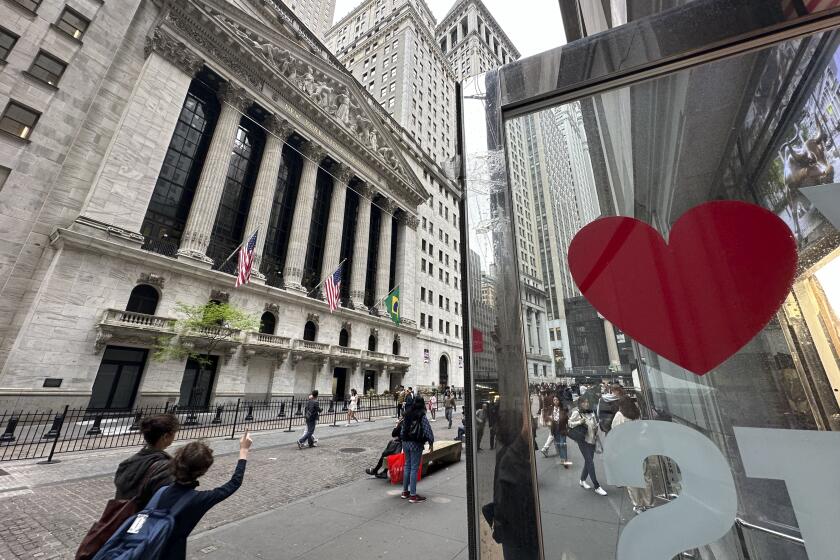Judge Stuns Milken With 10-Year Sentence : Securities fraud: She says the term is intended to make an example of the ex-junk bond king. She is convinced that he has committed additional serious crimes.
A federal judge sentenced an apparently stunned Michael Milken to 10 years in prison Wednesday after ruling that the crimes he pleaded guilty to were neither minor nor isolated.
The sentence was by far the harshest imposed in the recent chain of Wall Street scandals.
U.S. District Judge Kimba M. Wood said the unexpectedly long prison term is meant to make an example of the former Drexel Burnham Lambert junk bond king, whose innovative use of high-yield, high-risk bonds had fueled the corporate takeover frenzy of the 1980s. Milken had pleaded guilty to six felony securities law violations last April.
But in a jammed courtroom in Manhattan’s federal courthouse, Wood said that Milken, 44, who has been accused, among other things, of helping to bring on the national savings and loan disaster, could not be blamed for all of the financial excesses of the 1980s. Wood said she had not made him a scapegoat for “the decade of greed.” The judge said she based the sentence only on evidence of specific crimes presented in court.
Milken family members, supporters and lawyers were plainly shocked by the sentence. One close Milken adviser said: “No one could have imagined this in their wildest nightmare.” Defense lawyer Arthur L. Liman left the courthouse without commenting and did not return phone calls later.
Milken’s sentence also included three years’ probation during which he must perform full-time community service. The judge left open the possibility of reducing the sentence if Milken cooperates with the government.
Milken could have been sentenced to as many as 28 years. But a number of lawyers who had followed the case closely predicted that he would get no more than five. A Milken spokesman said that no decision had been made on whether to appeal the sentence.
During his own lawyer’s presentation before sentence was imposed, Milken at times was in tears in the courtroom. He then stood and, choking back sobs, said: “What I did violated not just the law but all of my own principles and values. I deeply regret it and will for the rest of my life, and I am very deeply sorry.”
But when the judge read the sentence, he stood rigid and motionless, with what appeared to be a look of disbelief when she announced the 10-year term. Wood also sentenced him to three years of community service while on probation after his prison sentence. Milken and his wife, Lori, did not comment to reporters and were permitted to leave the courthouse through a back exit.
Under his plea agreement, Milken was already committed to pay $600 million in fines and penalties. Lawyers said he must turn over that amount before the end of the year. Because of his huge earnings at Drexel, however, his wealth is expected to be at least hundreds of millions of dollars.
Wood said evidence presented during a pre-sentencing hearing in October convinced her that Milken had committed additional serious crimes beyond the six felony counts he pleaded guilty to in April. Among them, she said, were several acts of obstruction of justice relating to orders or suggestions to employees to destroy documents.
The judge also rejected longstanding defense claims that Milken’s crimes were aberrations by a generally law-abiding man and that they were the result of overzealousness to help clients rather than greed.
Wood called Milken “a man of talent and industry.” But she said: “This kind of misuse of your leadership position and enlisting employees who you supervised to assist you in violating the law are serious crimes warranting serious punishment and the discomfort and opprobrium of being removed from society.”
At Liman’s request, the judge agreed to sentence Milken under a provision of federal law that allows him to be paroled at any time at the discretion of the federal parole commission. Although Milken technically could be paroled almost immediately, government lawyers said the commission normally requires prisoners to serve close to two-thirds of their sentence. In Milken’s case, that would be about six years.
The sentence exceeds all others imposed in the series of securities fraud cases that grew out of the insider trading case against investment banker Dennis B. Levine in 1986. Levine himself got two years. Stock speculator Ivan F. Boesky, implicated in insider trading on an even grander scale, got only three years. Investment banker Martin A. Siegel, who directly stole information from his own corporate clients and also received suitcases stuffed with cash from Boesky, was let off with only two months.
But in those cases, the defendants had fully cooperated with the government before their sentencing, turning in prominent former business associates. Milken had not. Under the highly unusual terms of his plea agreement, he is obliged to begin cooperating only now that the sentence has been imposed.
The judge said she would consider reducing the sentence if prosecutors eventually certify to her that Milken has cooperated fully.
Several lawyers said they interpreted the long sentence as an attempt by the judge to ensure that Milken cooperates fully, revealing whatever incriminating information he knows about corporate raiders, junk bond buyers and former co-workers. Charles Carberry, a lawyer who once headed the U.S. attorney’s securities fraud unit in New York, said: “I think it was a clear message that he should cooperate.”
John C. Coffee, a Columbia University law professor, said the judge may also have imposed the severe sentence because Milken occupied a position of trust at the center of the financial world. “There’s a long tradition here of viewing very seriously abuses by people with high responsibilities, and this man was at the crossroads of capitalism,” Coffee said.
The six counts that Milken pleaded guilty to included conspiracy, securities fraud, causing the filing of false information with the Securities and Exchange Commission, mail fraud and aiding in the filing of a false tax return.
The sentencing capped the most massive securities fraud investigation ever carried out by the government. Milken, who joined Drexel while still in business school in 1969, plucked junk bonds from obscurity and almost single-handedly built what at its peak became a $200-billion market. From Drexel’s junk bond headquarters in Beverly Hills, Milken orchestrated transactions that made possible huge leveraged buyouts of such companies as Storer Communications and Beatrice Cos.
But as investigators closed in, Milken was forced to resign from Drexel in 1989, after he was named in a 99-count racketeering indictment and the firm itself pleaded guilty to six felony counts. Months later, the junk bond market started to collapse. And in February, Drexel was forced into bankruptcy proceedings.
Milken’s pay at Drexel peaked in 1987 at $550 million. In addition to total compensation of more than $1 billion from 1984 to 1988, Milken is believed to have received hundreds of millions of dollars from private partnerships he set up to benefit himself, family members and employees.
Milken’s lawyers, however, said that Milken’s lifestyle was relatively modest and unmaterialistic. They noted that he had given much of his earnings to charities and that he long had personally worked for them, such as by teaching math to abused and abandoned inner-city children.
Liman called Milken “a sensitive human being with a social conscience whose offenses stand in sharp contrast to his whole life and to his value system.” Liman also argued that Milken is “just not cut from the same cloth as Ivan Boesky.”
The judge did not dispute that Milken had donated much to worthy causes, nor that his charitable activities began well before the investigation of him started in 1986. But she said that was not enough to make up for his crimes.
During the sentencing, Wood disclosed for the first time her findings on the unusual pre-sentencing hearings she presided over in October. The so-called Fatico hearings were held to determine if there were evidence of additional crimes beyond the six to which he pleaded guilty. Under federal court rulings, Wood is allowed to consider evidence of other crimes in deciding on a sentence.
In a lengthy written opinion released Wednesday, Wood found that Assistant U.S. Attorneys John Carroll and Jess Fardella had failed to prove some of their main claims. She said there was insufficient evidence to prove that Milken was behind a manipulation of WickesCos. stock in 1986. She said the government also did not prove its claim that Milken was guilty of insider trading in Caesars World securities in 1983, and also failed to show that he had illegally made lucrative investment opportunities available to employees of investment funds as inducements to get them to buy riskier securities for their funds.
But she found that Milken had obstructed justice, in part, by arranging the destruction of a blue ledger book that showed illegal transactions between Drexel and David Solomon, head of Solomon Asset Management. The judge said Milken also had made remarks to employees in the Beverly Hills office in November, 1986, which could only be interpreted as instructions to destroy documents.
Wood also found that Milken had acted improperly by not disclosing to the leveraged buyout firm Kohlberg Kravis Roberts & Co. that he had kept extremely valuable warrants in a KKR deal for himself and his family instead of selling them to customers.
During the sentencing, Wood derided defense claims that Milken was basically law-abiding and that if he were not, he would have committed more blatant crimes, such as insider trading. She said that an equally likely explanation was that Milken was simply afraid to do anything too blatant.
“Your crimes show a pattern of skirting the law, stepping just over to the wrong side of the law in an apparent effort to get some of the benefits from violating the law without running a substantial risk of being caught,” she said.
Wood’s sentence was viewed as a rebuff to many prominent Southern Californians who had written to her urging that Milken’s sentence be limited to community service. Among those who had proposed that Milken was suitable for such service was Los Angeles Police Chief Daryl F. Gates, who suggested that Milken work for the Police Department’s DARE program, created to help inner-city children. In court, Liman had proposed that the judge accept Gates’ suggestion. The chief, through a spokesman, declined to comment on the sentence.
James Slade, a spokesman for the federal Bureau of Prisons, said that under Justice Department rules, the 10-year term makes it unlikely that Milken will be allowed to serve his sentence in a minimum-security federal prison camp. Such camps, where Boesky and others caught up in the Wall Street scandals served their sentences, have open rooms instead of cells and offer extensive recreation facilities.
Instead, Slade said, Milken probably will be sent to a medium-security prison, where there will be a higher concentration of street criminals and fewer white-collar offenders. He said that in some medium-security prisons, inmates are locked in old-fashioned barred cells at night.
Staff writer Paul Richter in New York contributed to this story.
FALL OF THE JUNK BOND KING
Here is a chronology of key developments in the prosecution of former Drexel Burnham Lambert Inc. high-yield bond chief Michael Milken: Nov. 14, 1986: Stock speculator Ivan F. Boesky agrees topays $100 million to settle charges of insider trading, cooperate with investigators and plead guilty to a single criminal count. Later is sentenced to three years in prison. Nov.-Dec. 1986: Published reports link Milken to an illegal insider trading network led by Boesky. Sept. 7, 1988: The Securities and Exchange Commission accuses Drexel, Milken and three others of violating a range of securities laws, most in connection with Boesky. Dec. 21, 1988: Drexel agrees to plead guilty to six felony counts and pay $650 million in fines and restitution to settle the biggest securities fraud probe in history. March 29, 1989: A federal grand jury indicts Milken, his brother, Lowell, and former Drexel trader Bruce Newberg on 98 counts of racketeering and fraud, based on information fromBoesky. April 7, 1989: The Milkens plead not guilty Newberg does the same later. April 13, 1989: Drexel and the SEC announce a settlement of the government ‘s civil fraud case against the firm that subjects Drexel to federal monitoring for three years and forces it to sever ties with Milken. June 15, 1989: Milken resigns after 19 years at Drexel to form his own consulting firm. Lowell Milken quits to return to practice law. Sept. 11, 1989: Drexel formally pleads guilty and begins paying its fine. Feb. 13, 1990: Drexel’s parent company, Drexel Burnham Lambert Group, files for bankruptcy court protection after defaulting on debts and begins laying off employees. March 19, 1990: Prosecutors promise to bring a new indictment with broader charges against Milken by the week of April 16. April 20, 1990: Milken agrees to settle his case and reaches a plea bargain with the government. April 24, 1990: Milken tearfully pleads guilty to six felonies, agrees to pay $600 million in restitution and fines, and agrees to cooperate with the government after sentencing. He faces up to 28 years in jail. October 1990: Special two-week hearing to consider the government’s array of charges against Milken, ordered by U.S. District Judge Kimba Wood to gain greater insight into Milken’s character in order to fashion a fair sentence for the six counts he admitted. Nov. 21, 1990: Milken is sentenced to 10 years in jail, plus three years’ probation, plus 1,800 hours of community service. The sentence could be reduced if Milken cooperates with the government in ongoing and future investigations.






